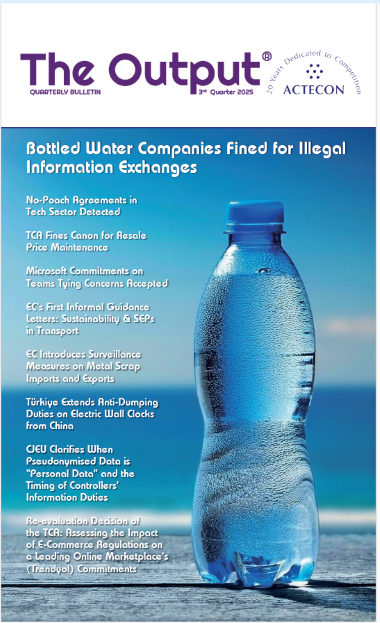Corporate Liability Redefined: TCA’s Stance on Employee-Leaked Competitive Information
| Competition Law

Article By Caner K. Çeşit, Gülbin Serin, Yiğit Eryılmaz
Introduction
The recent decision of the Turkish Competition Authority (“TCA”) in its investigation into Altıparmak Gıda A.Ş. (“Balparmak”) and Sezen Gıda Ltd. Şti. (“Anavarza”), prominent players in the bee products market, highlights a pivotal shift in corporate liability for employees’ anti-competitive behaviour when conducted without the company’s knowledge.
Unlike the approach to corporate liability taken in the Arçelik/Vestel case, where proactive compliance measures absolved an undertaking of liability, the TCA held Balparmak accountable for an employee’s unilateral disclosure of competitively sensitive information to a competitor. This illustrates a growing expectation for businesses to not only establish rigorous compliance frameworks but also actively monitor and address potential breaches to mitigate liability.
As a background note, the TCA initiated an ex officio investigation against Balparmak and Anavarza to determine whether they have violated Article 4 of the Law No. 4054 on the Protection of Competition (“Competition Law”) by way of exchanging competitively sensitive information. While Anavarza settled with a fine of TRY 513,329.91 (approx. EUR 20,028), Balparmak’s withdrawal from the settlement process led to a fine of TRY 2,477,859.92 (approx. EUR 96,678).
The case is particularly noteworthy as it signals the TCA’s stricter stance to corporate accountability, irrespective of whether the conduct occurred with or without the company’s knowledge or authorization. This emphasizes the critical importance of proactive corporate responsibility in ensuring compliance with competition rules.
Assessment of Unilateral Disclosure of Future Price Information
In assessing Balparmak’s conduct under competition rules, the TCA evaluated documents obtained during on-site inspections, revealing communication between Balparmak’s Sales Manager and Anavarza’s Marmara Regional Sales Manager. The TCA assessed that these documents indicated that Balparmak had shared its future price lists with Anavarza on multiple occasions between December 2020 and December 2022. This information, including Balparmak’s planned price increases and future pricing details, was transmitted via emails, revealing a coordinated pattern of information disclosure. The TCA found that this disclosure of forward-looking strategic information restricted competition by allowing competitors to align their pricing strategies and thereby facilitating greater coordination.
Further, Anavarza’s internal records showed that the future pricing insights and related analyses from Balparmak were reported to its top management, indicating that Anavarza utilised this information to shape its strategic decisions.
The TCA concluded that Balparmak’s unilateral disclosure of future pricing information enhanced market transparency, enabling Anavarza to adjust its pricing and sales strategies accordingly. Importantly, there was no evidence of a reciprocal information exchange, as no information flowed from Anavarza to Balparmak. Such disclosure solely benefited Anavarza by reducing market uncertainty. The TCA ultimately determined that Anavarza’s access to Balparmak’s future price lists and price revision schedules undermined its independence in setting its own strategies, constituting a competition law violation, even in the absence of an explicit agreement or mutual exchange.
Assessment of Liability of Balparmak for Actions of its Employee Conducted without its Knowledge
In the Balparmak decision, the TCA evaluated the responsibility of undertakings for the actions of their employees in the context of competition violations. The investigation revealed that a Balparmak employee shared future pricing lists with Anavarza’s Marmara Regional Sales Manager by forwarding these lists from a personal email account. This raised the issue of corporate liability under the Competition Law since Balparmak claimed that it should not be held accountable for its employee’s unilateral conduct.
Balparmak contended that when an employee acts with the intention to harm the undertaking, the undertaking (which has already suffered damages due to this conduct) should not be penalized separately under the Competition Law. The company also asserted that it was unaware of the employee’s actions, which disregarded Balparmak’s commercial interests, and that it should not be held responsible for an employee’s sharing of competitively sensitive information from a personal email account with a competitor in a manner detrimental to Balparmak’s interests.
The TCA emphasized that undertakings are liable for anti-competitive actions by their employees, regardless of the employee’s position within the company or whether the conduct was expressly authorized. This stance is supported by the European precedents (see CJEU in Becu, para 26, Viho/Parker Pen and BPB cases), which highlight an employer’s liability for oversight failures (culpa in vigilando) and improper delegation (culpa in eligendo). Further, the TCA referenced its own decisions (see TCA in Supply and Burdur Otogaz Decisions) underscoring that employees are part of the undertaking, and their actions are binding on the undertaking under the competition rules.
Ultimately, the TCA rejected Balparmak’s defence that it should not be penalized for actions allegedly taken outside its official oversight or control. It held Balparmak responsible for its employee’s actions, concluding that the sharing of competitively sensitive information with a competitor constituted a violation of Article 4 of the Turkish Competition Law. The TCA determined that accepting Balparmak’s argument would undermine the effectiveness of the Competition Law enforcement and reaffirmed the company’s liability for the anti-competitive actions of its employee.
Conclusion
The Balparmak decision offers insightful guidance on the TCA’s approach to corporate liability in cases involving the disclosure of competitively sensitive information by employees. In the Balparmak decision, the TCA held the undertaking directly accountable for its employee’s actions, finding the company liable for the anti-competitive conduct of sharing future pricing information with a competitor. Balparmak’s argument that the employee acted unilaterally and against the company’s interests was deemed insufficient to absolve it of liability. The TCA emphasized that employees, regardless of intent or position, are integral to the economic entity of the undertaking, making their actions attributable to the company under competition law principles.
However, the TCA’s stance on corporate liability has not always been uniform. In the earlier Arçelik/Vestel decision, the TCA adopted a different approach, allowing for a pathway by which companies could potentially avoid liability if they could demonstrate a lack of awareness and control over employee conduct. In the Arçelik/Vestel decision, the TCA launched an investigation after Arçelik’s leniency submission disclosing that an Arçelik employee had shared competitively sensitive information with an employee of competitor Vestel. Arçelik proactively detected this information disclosure through its internal compliance program and reported it to the TCA under the Regulation on Active Cooperation for Detecting Cartels. Arçelik demonstrated its commitment to compliance by showing it had rigorous internal controls, including third-party oversight at industry association meetings and routine audits, through which it detected the violation independently. Based on this evidence, the TCA concluded that Arçelik was unaware of the employee’s actions and thus could not be held liable.
The contrast between these cases highlights the TCA’s expectation that undertakings actively demonstrate compliance with the Competition Law and take responsibility for monitoring employee conduct. While the Arçelik case illustrates that, with sufficient evidence, undertakings may rebut this presumption of liability by showing a lack of awareness and implementing effective compliance measures; the Balparmak case underscores that failure to detect and report the presumable violations independently leaves the undertaking fully liable.
Ultimately, the TCA imposes a high burden of proof on undertakings to demonstrate they are not liable for employee misconduct. Both decisions emphasize the importance of internal compliance programs and the proactive detection of potential competition law breaches as key strategies for mitigating liability.







